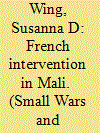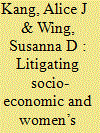| Srl | Item |
| 1 |
ID:
144330


|
|
|
|
|
| Summary/Abstract |
The March 2012 coup in Mali opened the door to expanded territorial occupation in northern Mali by Tuareg separatists and subsequently armed Islamist extremists. French forces intervened at the behest of the interim government in Mali. This article examines how various actors frame the conflict to their advantage. While the Malian government and France are allies, the position of various Tuareg actors shift over time as they strategize and weigh the value of allegiance with the French. Local extremist organizations are labeled as terrorists and are targeted as enemies. This article argues that the conflict has been decontextualized and framed within the ‘war on terror’. France’s decision to intervene and to expand their regional military presence, rather than exit, is legitimized by the framing of their intervention as integral to counterterrorism efforts.
|
|
|
|
|
|
|
|
|
|
|
|
|
|
|
|
| 2 |
ID:
185367


|
|
|
|
|
| Summary/Abstract |
Scholars debate the role of legal institutions in promoting human rights in Africa. Much of the discussion focuses on Anglophone countries and does not examine the gender of litigants. We propose a constitutionalism constrained perspective that argues that which and whose rights are adjudicated are shaped by the context of constitutional reform. Where reformists are primarily concerned with safeguarding civil and political rights, high courts may protect civil and political rights claims more often than socio-economic ones. Examining hundreds of human rights decisions issued by Benin’s Constitutional Court, we ask, which and whose rights does the court protect? We find the court is more likely to reject litigants’ claims on technical grounds when the issues involve socio-economic rights than when they concern civil or political rights. When a case is heard, moreover, the court finds violations of civil and political rights more often than socio-economic rights. Further, we find that an overwhelming percentage of litigants are men; women rarely appear as petitioners, although when women’s claims are heard, they are just as likely to succeed. Our findings about socio-economic rights and gender in Benin’s Constitutional Court have broader implications for understanding the limitations of constitutional reform.
|
|
|
|
|
|
|
|
|
|
|
|
|
|
|
|